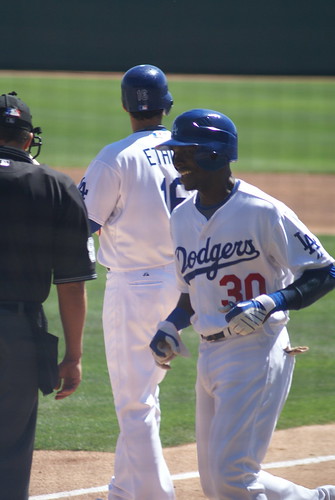From Fox's Ken Rosenthal, via Sons of Steve Garvey:
[Orlando Hudson's] deal includes a stipulation that the Twins cannot offer him salary arbitration if he is a Type A free agent, ensuring that a team can sign him next off-season without losing a draft pick.(An extensive overview of baseball free agency can be found here, for those of you who aren't familiar.)
Hudson's deal raises the expected value of his contract for 2011. If the Twins had offered Hudson arbitration after the season and he refused, his next team would have had to surrender a first-round draft choice for the right to sign him.
There are various methods for estimating the value of a ballplayer (here's a good one), but say that at the end of the season, the Yankees value Hudson's services for 2011 at $7 million. Say that the Yankees also value their 2011 first-round draft pick at $500,000 (admittedly an arbitrary number, but I will attempt to justify it later). If the Twins offer arbitration, the Yankees would be willing to sign Hudson for only $6.5 million, because they have to surrender the draft pick. Without this restriction, Hudson could sign for the full $7 million.
Of course, arbitration is unpredictable (and often unpleasant), so it's possible that Hudson would have won even more than $7 million with the Twins under my hypothetical scenario (even though they don't value him that high). But it's probably in most players' interests to forgo this possibility in hopes of attracting more bidders from around the league and thus securing a more lucrative deal.
Is this contract provision costing Hudson this year, as it decreases the Twins' options and thus the amount of money they're willing to pay him? The right to offer arbitration is only valuable to the Twins if Hudson performs well this year, he fits into their 2011 plans, and they believe that arbitration (or the threat of going to a hearing) will make him easier to re-sign. All of these things are hard to judge a year in advance, so it's doubtful that the Twins would value such a right more than another team would value its first-round draft pick. Suppose that Hudson's value to the Twins this year drops $250,000 because of his contract stipulation, so he is offered a contract of $5 million instead of $5.25 million. Hudson can realistically expect to make up this money and more in his 2011 contract.
If Hudson's skills diminish to the point that no one wants him beyond a minor league deal, the Twins wouldn't have offered arbitration anyway, so it becomes a moot point.
As far as my estimation of the worth of a first-round pick, note that such a pick in baseball is worth considerable less than it is in other sports. A first-rounder takes years to develop in the minor leagues and is far from guaranteed to become a star. (For instance, 20 of the 44 players whom the Dodgers have drafted in the first round before 2005 never played a single inning in the big leagues.)

No comments:
Post a Comment